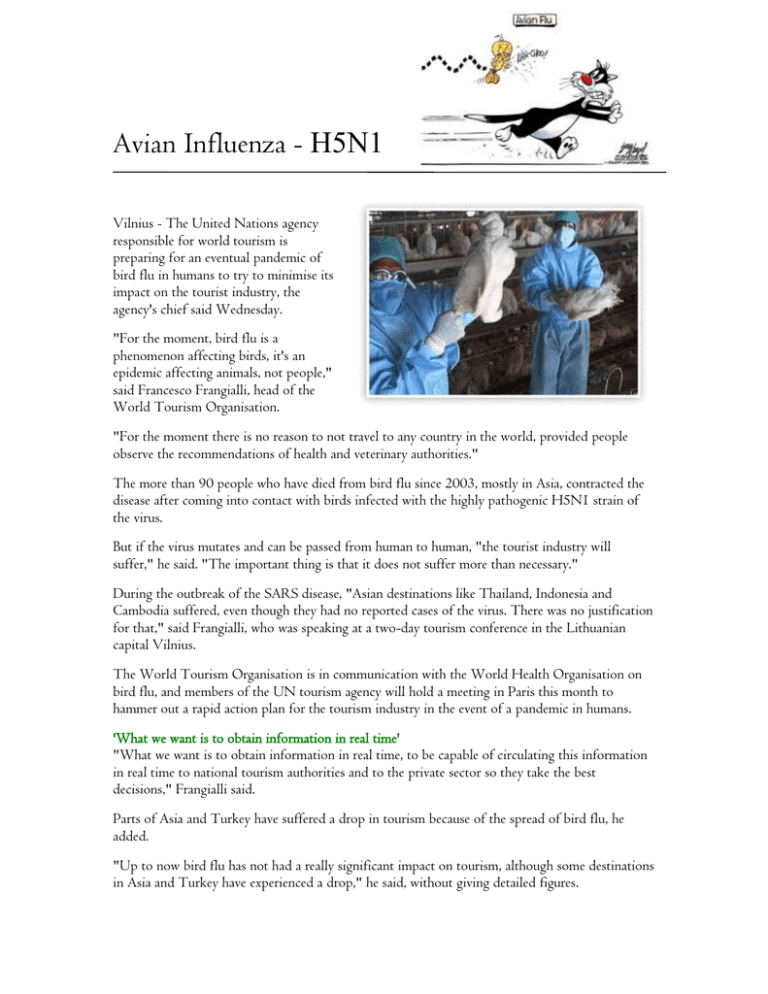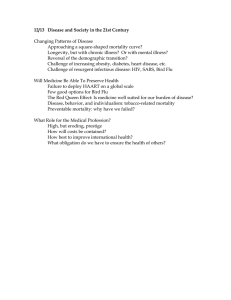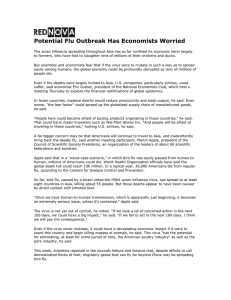Avian Influenza - H5N1
advertisement

Avian Influenza - H5N1 Vilnius - The United Nations agency responsible for world tourism is preparing for an eventual pandemic of bird flu in humans to try to minimise its impact on the tourist industry, the agency's chief said Wednesday. "For the moment, bird flu is a phenomenon affecting birds, it's an epidemic affecting animals, not people," said Francesco Frangialli, head of the World Tourism Organisation. "For the moment there is no reason to not travel to any country in the world, provided people observe the recommendations of health and veterinary authorities." The more than 90 people who have died from bird flu since 2003, mostly in Asia, contracted the disease after coming into contact with birds infected with the highly pathogenic H5N1 strain of the virus. But if the virus mutates and can be passed from human to human, "the tourist industry will suffer," he said. "The important thing is that it does not suffer more than necessary." During the outbreak of the SARS disease, "Asian destinations like Thailand, Indonesia and Cambodia suffered, even though they had no reported cases of the virus. There was no justification for that," said Frangialli, who was speaking at a two-day tourism conference in the Lithuanian capital Vilnius. The World Tourism Organisation is in communication with the World Health Organisation on bird flu, and members of the UN tourism agency will hold a meeting in Paris this month to hammer out a rapid action plan for the tourism industry in the event of a pandemic in humans. 'What we want is to obtain information in real time' "What we want is to obtain information in real time, to be capable of circulating this information in real time to national tourism authorities and to the private sector so they take the best decisions," Frangialli said. Parts of Asia and Turkey have suffered a drop in tourism because of the spread of bird flu, he added. "Up to now bird flu has not had a really significant impact on tourism, although some destinations in Asia and Turkey have experienced a drop," he said, without giving detailed figures. The number of foreigners visiting Turkey in January fell 4,7 percent compared with the same month one year ago, according to government figures, although the drop was blamed on global tensions over caricatures published in the European press of Islam's prophet Mohammed as well as fears of bird flu. The World Tourism Organisation is an agency of the United Nations. It describes its role as providing a global forum for tourism policy issues and a practical source of tourism know-how. Sapa-AFP Turks bitter as bird flu hits tourism TURKEY’S tourism industry was plunged into crisis last week as foreigners cancelled their hotel reservations and a British holiday haven on the Aegean coast was placed under quarantine because of the spread of the bird flu virus. Thousands of birds in Kusadasi, whose name means “bird island”, were destroyed on Wednesday and Thursday after a dead pigeon, duck and blackbird were confirmed as having had the disease that has killed three children in eastern Turkey and infected 18 other people. Tests were being done yesterday to determine whether the death of a fourth child on Friday had been caused by bird flu. There was no evidence that the H5N1 virus had mutated into a form that could be transmitted among humans. An announcement on Wednesday, however, that it had invaded this ancient town, a favourite with British and Irish holidaymakers, prompted calls from worried Europeans cancelling bookings made for the spring and summer. “It is a disaster,” said Sevan Nisanyan, a guide book writer and hotel owner in the hilltop village of Sirince. “I have spoken to hotels up and down the coast and in the past two days there has been a torrent of cancellations from Europe, from people terrified of bird flu who have decided not to chance it in Turkey.” Residents have every reason to believe in a curse. When it was placed under bird flu quarantine last week, the town renowned for its hedonistic nightlife was only just recovering from a bombing by Islamic extremists last July in which five people, including a British and an Irish tourist, were killed. “This has been sent to test us,” said Ugur Limani as he lifted a writhing sack of doomed geese into the back of a lorry just outside Kusadasi on Wednesday. He was one of an army of men in masks and white boiler suits deployed to disinfect cars and round up birds for destruction as the virus flared across the country. Officially, the birds were being humanely disposed of with gas but there were reports of chickens and geese being buried and burnt alive in the hurry to get the job done. Complicating matters for the authorities was the public’s reluctance, particularly in the impoverished east, to part with poultry that is often a prime source of food. It was estimated that only a fraction of the bird population in affected areas had been destroyed. “It is hard to understand the rationale behind this killing,” said Nisanyan, the hotel owner, whose 54 chickens have been taken to a place of “temporary exile” to keep them safe until the crisis is over. “My birds are perfectly healthy. I would eat them sooner than hand them over to the authorities.” Hayrettin Huner, a tour guide and fig grower, was just as indignant about the prospect of disposing of his chickens. “They are my pets,” he said, casting a loving glance at a dozen hens pecking gravel in his driveway. “Each morning they come to the front door to wait for me. They are beautiful birds. Would those government bureaucrats ask for a cull of animals if it were dog flu?” Some citizens were more co-operative. Suleyman Demirel, the former president, called in municipal workers to dispose of the flock of hens he kept in the garden of his sumptuous townhouse in central Ankara. According to the government 180 people — nine of them in the Aydin holiday province — were being monitored in hospitals after displaying symptoms of bird flu, which appeared in the far east of the country three weeks ago and has spread quickly amid accusations that Turkey did not act fast enough to contain it. The 18 confirmed Turkish cases of bird flu in humans over the past three weeks — including the three dead Kurdish siblings — were a surprisingly high figure considering that only 140 people are reported to have caught the disease in southeast Asia in the past four years. This could be explained by a British study suggesting that the Turkish bird flu may have mutated into a strain that could be more easily caught by humans than its Far Eastern counterpart. Even so, some experts said that an inexplicable 12-day delay in ordering a cull of birds after the first outbreak was the reason the virus had erupted simultaneously in so many parts of the country. This meant that it might now be impossible to eradicate bird flu from Turkey, a staging post for millions of migrating birds every year. The World Health Organisation last week praised Turkey, whose main revenue earner is tourism, for belatedly taking the right measures and said there was no reason to cancel holidays there. Hundreds of thousands of leaflets had been distributed and vans with loudhailers were warning children not to touch dead birds. One toddler stricken with the illness was said to have thought a sick chicken was crying and wiped away its “tears” with his hand. According to his mother, he then wiped away his own tears with the same hand. Britons in Turkey kept a stiff upper lip even as cancellations at home suggested a panic. There was no rush to the regional airport at Izmir. “We’re avoiding contact with dead chickens, obviously,” said Chris Howell, a London teacher looking at Apollo’s temple in the town of Didyma. “We’re not thinking of leaving.” Fred Matthews, a pensioner who is one of 5,000 British property owners in Didyma, was just as stoic. “My Turkish friends tell me the birds get sick and die every year,” he said in the house he has shared with Janet, his wife, for the past five years. “There is absolutely no cause for alarm.” He was much more worried about a rise in the cost of living. “A glass of beer is double what it was a year ago,” he complained. Mumin Kamaci, the mayor, at least sounded happy. “If it weren’t for all these British people, our town might have died out by now,” he said, sipping tea with estate agent friends at a table in one of his two restaurants. “I hope the bird flu passes quickly. There is much more land to sell.” Questions: 1. What is the United Nations organizations responsible for tourism preparing? 2. Is their any reason not to travel to other countries at the present time? Why or Not 3. What is keeping the tourist industry from suffering severly from H5N1? 4. How have the majority of people who have died from the bird flu contracted it? 5. How did many South East Asian countries suffer from the SARS epidemic? 6. Does bird flu have a significant impact on the tourism industry at the preset time? 7. What event recently plunged Turkey tourism industry into a crisis? 8. What is being done to get rid of the infected birds? 9. What has complicated matters in terms of the removal of the birds? 10. What is a British study saying about this strain of bird flu in Turkey? 11. What countries provide most of the tourism in Turkey?



